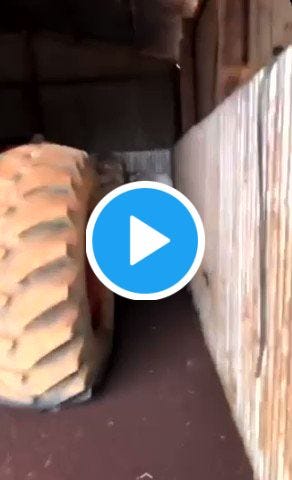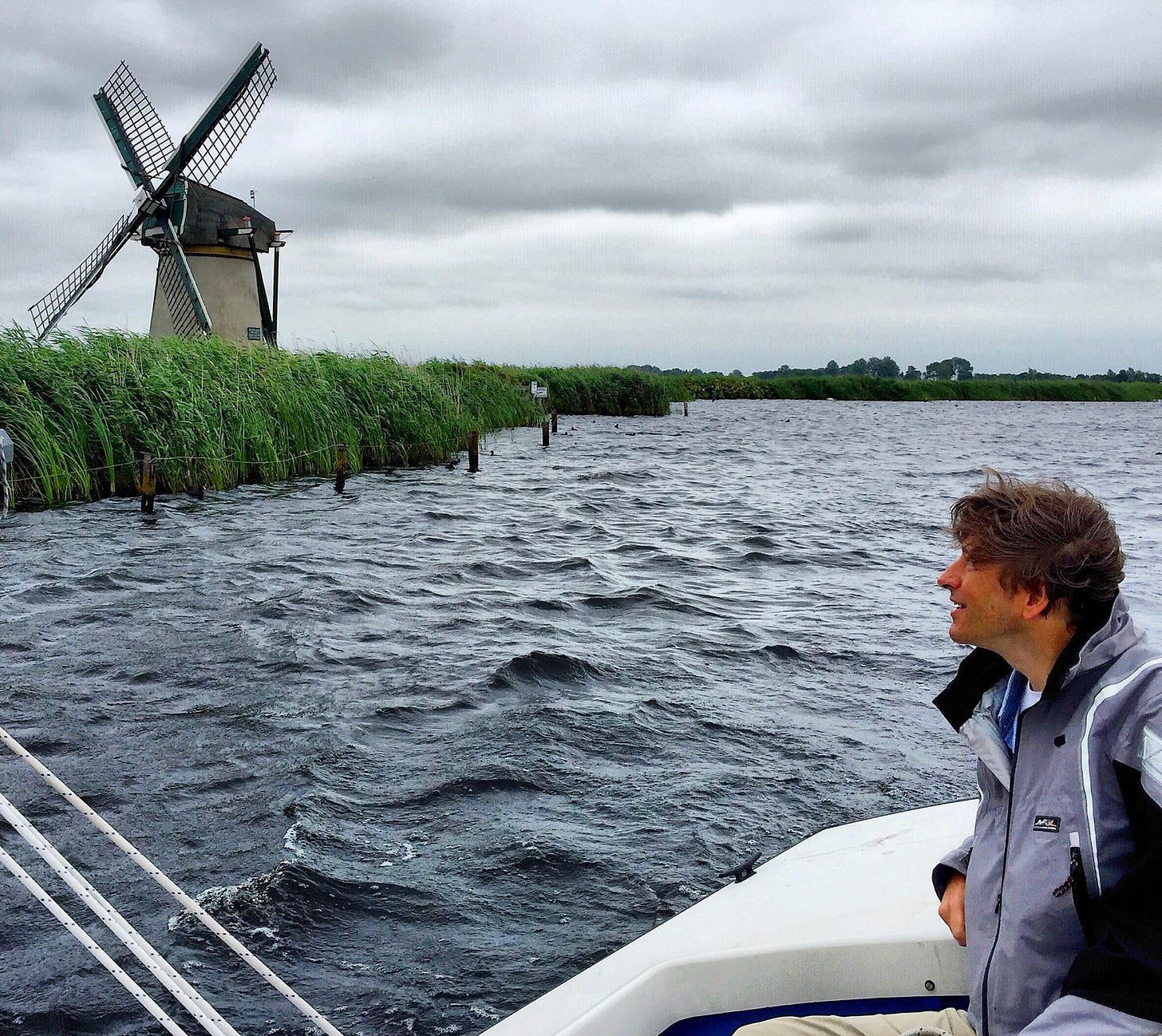You have better chances of winning the lottery than by being hit by a meteorite.
Good news for the planet: NASA calculated that a deadly asteroid will not hit us in 47 years from now.
As I wrote yesterday, we are insufficiently worried about our near future when it concerns climate change. But some of us, including some that deny man-made climate change, lose quite a bit of sleep over the risk of being hit by asteroid Apophis. Discovered in 2004, it quickly became known as a scary object that might hit the earth. A vision that brings to mind artist impressions of fearsome dinosaurs running away from a fireball in the sky some 66 Million years ago.
Apophis is much smaller than the 10 kilometers wide (or more) dinosaur killer, but with a size of some 340 meters, you don't want it to hit our planet either. NASA had already ruled out 2029 as a potential crash year ('29 has some reputation in that regard), and 2036 was also declared safe. In both years, Apophis gets close to earth but not close enough to hit us. But 2068 remained on the list as a year with a slight chance of risk.
Astronomers recently analyzed new data gathered during a recent flyby of Apophis. They can now rule out any risk for an impact in 2068 and many years after that.
Comet or asteroid?
A recent study from Harvard theorized that a piece of a comet, instead of an asteroid, caused the dinosaur extinction. A comet is mostly frozen gas, while an asteroid is a piece of rock. And that difference is one of the arguments from those experts that do not agree with this new theory. Meteorite samples of asteroids found on earth contain Iridium, one of the rarest elements on earth, found worldwide in the geological layers formed some 66 million years ago. A strong indication that it was an asteroid that hit us (well, those dinosaurs).
Whoever is right, I like the words that one of the authors of the study, Abraham Loeb, used to describe the event: "It must've been a beautiful view, but the fun ended when the rock hit the ground." I suppose that most scientists will agree with that part of his theory. However, we may assume that the fun part must have been so much shorter than the dark years that followed.
Those stony asteroids mainly belong to the asteroid belt between Mars and Jupiter. But the suspected comet must have come from the Oort Cloud, much further away. This cloud of icy space debris near the solar system's cosmographic boundary was first described in 1950 by the Dutch astronomer Jan Oort.
Explorer of the universe
Born in 1900, Oort was an older man when I knew him as a neighbor, living some houses further down the street. I had no idea how famous he was. After he died in 1992, the New York Times called him "one of the century's foremost explorers of the universe." The European Space Agency described him as "one of the greatest astronomers of the 20th century". For me, he was the owner of 'our' boat, an open sailing boat from a class of ships called 'Vrijheid,' the Dutch word for Freedom. As the name suggests, the first one was designed in 1945. His boat had number 68, so I guess it was produced when he described the far away belt that now carries his name.
In the early 1980's he didn't go sailing anymore, so together with a friend of mine, we got the boat if we promised to take good care of it, including doing the repainting and repairs during the winter. I have lovely memories of long summers in that boat on the lakes of Holland, not far south of Schiphol airport. I must somewhere have pictures of those days, but here is a more recent one of a couple of years ago where I am sailing on the same lakes, with one of the many old windmills in the background. This polyester boat is about similar in size to the wooden Vrijheid of Professor Oort.
Years later, the municipality built two bridges over the canal in our village. A big one for cars and bicycles, and a bit further, they made a wooden one for the pedestrians on a quiet spot. As politics go even in the best of countries, those in charge named this village's main bridge after a retired mayor. The small wooden bridge was named after one of the greatest astronomers of the 20th century. If you ever happen to discover a tiny insignificant belt of space debris in a forgotten corner of the universe behind the Oort Belt, let me suggest a name for you.
In case I scared you with stories of fallen meteorites, and you worry about being hit by one, here is a nearly ten-year-old article to reassure you. In short: the chances of winning the lottery are better than being hit by a meteorite.
Meanwhile, on earth, those who thought that we could just irresponsibly party until the end of times in 2068 will have to prepare for a more extended stay of our species on this planet. And that comes with a responsibility to protect and preserve the only home we have.
And a bit extra reading for the weekend.
In the past few days, I followed a mix of good and bad news that I thought would be interesting to share. But once you read what I am writing now on Friday night in Ottawa, your weekend will have started. Therefore, I will present you with an out of balance positive picture of our challenged planet. I promised happy stories for the weekends. Just skip the first one about mice if you only want the good news.
Rural areas in New South Wales deal with a severe plague of mice. For those who missed the bigger picture of Australia: there have been years of drought, extreme wildfires (remember the koala pictures?), a pandemic, and massive flooding. Add to this Anthropocenic cocktail of planetary disasters some millions of mice taking over houses and farms. This tweet gives you an impression.


Staying in Australia, a study found that sharks are vital to restoring damaged habitats, which is good news for fighting climate change.
There was happy news about the bunnies on the Welsh island Skokholm, where rabbits dug up a stone age tool from 9,000 years ago.
And here is some inspiration: an Indian teenager had seen the pristine beaches in Bali. Once back in his hometown Mumbai, he decided to organize volunteers to clean up the city beaches.
And a last one. In 2011, renewable energy provided just 37% of the national energy demand of Scotland. In that year, Scotland set an ambitious target to generate the equivalent of 100% of its electricity demand from renewables in 2020. The latest figures indicate that they just missed it, but 97.4% is still a remarkable improvement in just nine years. Well done, Scotland.
That's it for today. I wrote some ten days ago that I promised to write a minimum of 100 newsletters per year, so about two per week. But since I started some ten days ago, I haven't missed a day. It is your encouragement that made me write so much more. The many sign-ups for the free newsletter are a huge motivation. My special thanks go to those that subscribed.
I wish you all a wonderful weekend. Send some pictures if you see something beautiful on this planet.







Good morning Alexander, what a trip into your newsletter!. Ah, no, I leave it up to chance I do not buy lottery tickets. I prefer to go down the Rabbit hole when the Comet comes in! I may come out as an archaeological artifact later. I like the video about the Sharks being a 'key' to restoring damaged habitats. They have been doing that long before we arrived. But now we are loosing them. One mouse is cute but this rampage mouse horde is scary. Your sail boat would be a rescue from this menace. Thank you (-:
I just played the lottery, thanks for the reminder ;-)
How amazing that you knew Jan Oort and even got to sail on his boat! And Vrijheid - perfect name. I have a feeling Jan Oort would have liked that fact that a small bridge (rather than the bigger one) was named after him. I need to find out more about him, I think. He sounds like a fascinating man.
It's scary to think about what people are afraid of and what they will deny is happening. Thanks for putting this into your newsletter. It just shows the importance of education and science (i.e. fact-based) education. Fear is such a powerful weapon and education is one way of fighting it.
Thank you for this interesting post and also the extra reading at the end. I'm going to check some of it out -those mice are going to give me nightmares, though.